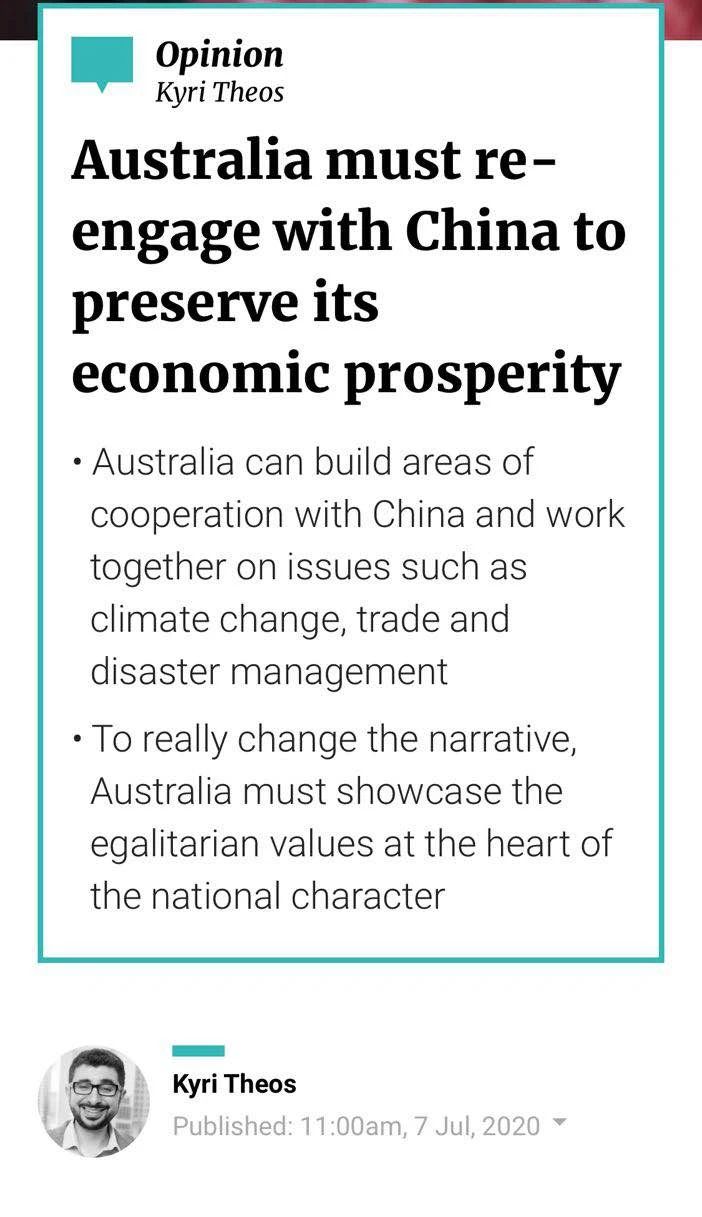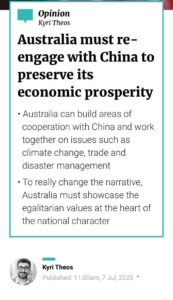中国澳大利亚商会华西总经理习克礼(Kyri Theos)于近期在香港南华早报发表题为“澳大利亚需重新建立与中国的关系”的文章
Austcham West China General Manager Kyri Theos had an opinion article featured in the South China Morning Post this week titled “Australia must rebuild its relationship with China”.
全文翻译如下:
中国和澳大利亚两国有着巨大的不同,通常情况下我们会为了巨大的经济利益而放下彼此的差异。但目前我们的关系却陷入了僵局,中国对澳大利亚投资下滑了60%,超过了其他任何国家。
近期关于来自中国网络攻击及政治干预的报道使得澳大利亚国内本就由新冠疫情爆发,加增大麦关税及香港问题产生的反华情绪进一步恶化。
在中国,民众对待澳大利亚的情绪也开始变得消极。澳大利亚发起的对中国新冠肺炎疫情爆发源头的调查激起了民众的负面情绪,这强化了中国民众一种普遍的观点——澳大利亚是美国的“跟班”,从中国的发展中获利。
中国的经济正在复苏,但对于那些寻求中澳关系重新发展的群体来说却充满挑战。
中国澳大利亚商会华西的情况便如此,我们正在努力使商务正常化, 但国家层面的声明持续加剧紧张情绪,使两国交往面临挑战。
那么, 在现如今紧张的政治气氛下,我们该如何维持紧密的经济关系呢?
澳大利亚可以借鉴日本的情况。尽管中国和日本有着深刻的历史问题及领土争端,日本却很好地平衡了与中国的经济关系以及与美国的战略关系。
日本在疫情初期为中国提供了包括口罩在内的重要防护物资,中国人民对此深表感激,他们在微博和微信朋友圈都对中日间友好关系表达了赞美之情。
善意的外交信号能慢慢改变中国国内的一些主流意见,这些意见对于澳大利亚来说尤为重要。我们对中国的许多出口都是由可自由支配的消费推动的,包括旅游、教育和食品。中国民众对澳大利亚的积极看法将帮助我们的出口行业。
澳大利亚的核心竞争力在于它干净的自然环境,高质量的教育体系以及卓越的生活质量。
这些竞争力为吸引中国增加了砝码,它们也是一种软实力,可以成为与中国民间深入交往的基础。
一项近期的调查表明澳大利亚是世界上最受青睐的留学目的地,去年有超过二十万中国学生赴澳学习。
这是影响中国中产阶级观念的一个特别机会,中产阶级在中国拥有巨大的影响力及发言权。赴澳学习的中国留学生归国后,他们的想法,观点和世界观都会焕然一新。
澳大利亚的影响力也与这些中国留学生与澳大利亚本地人之间的交往关系息息相关,个人层面的关系能帮助我们了解彼此国家间细微的差别和生活的现实。他们帮助我们认识到自己的偏见。
如果我们真的想改变中国对澳大利亚的看法,我们必须展示澳大利亚人核心的平等主义价值观。等疫情得到控制后,澳大利亚也许可以不仅为新西兰解除旅行限制,也可为中国打开国门。
目前中国正在面临着数十年未见的严峻汛情,经历过2011年昆士兰州洪灾,澳大利亚在洪灾管理方面积累了大量专业经验知识。如果澳大利亚为中国提供防灾经验和设备,这会被解读为一种友好的表示,意味着国关系最糟糕的阶段已经过去。这也是一件正确的事。
两国在几十年的交往中见证了彼此的繁荣,澳大利亚应该主动寻求与中国重新建立关系的机会。这样既能深化双方的影响力,又能保障彼此的经济发展。
中国澳大利亚商会华西总经理习克礼(Kyri Theos)
Australia must rebuild its relationship with China
China and Australia are very different nations. Normally we put our differences aside because of the overwhelming economic benefits.
But now we are at a stalemate. China’s investment in Australia has dropped 60%, faster than any other nation.
Recent reports of cyber attacks and political interference in Australia have exacerbated anti-China sentiment. Sentiment already soured by COVID-19, barley tariffs and the politics of Hong Kong.
In China, public opinion towards Australia has also turned negative. Australia’s call for an investigation into the origins of COVID-19 was poorly received. It reinforced a widely held view of Australia as a US lackey that has benefited from China’s growth.
China’s economy is reopening and there are now serious challenges for those of us seeking to reignite China-Australia trade.
On the ground at the Australian Chamber of Commerce in West China, the situation is difficult and complex. We are trying to get back to business, but statements at senior levels continue to inflame tensions and strain the relationship.
So how can we sustain a strong economic relationship in a tense political climate?
Australia can look to Japan as an example. Despite deep historical and territorial grievances, Japan has managed to balance its economic relations with China and its strategic ties to the U.S.
Japan provided significant aid to China at the outset of the pandemic, including masks and other PPE. This was warmly welcomed by the Chinese people, who took to Weibo and Wechat to praise the friendship between the two nations.
Diplomatic signals of goodwill can slowly begin to shift the popular narrative within China. This narrative is especially important for a country like Australia. Many of our exports to China are fuelled by discretionary purchases, including tourism, education and food products. A positive view of Australia amongst the Chinese people supports our export industries.
Australia’s competitive strength is its clean natural environment, its high-quality education system and its exceptional quality of life.
These assets are attractive in China and they can produce a unique advantage. They are also a soft form of power that can be the basis of deeper engagement with the Chinese people.
A recent survey ranked Australia as the world’s most desirable study destination. Last year more than 200,000 Chinese students studied in Australia.
This represents a unique opportunity to shape the ideas of the Chinese middle class. A huge and influential population that has a voice in China. Students who study in Australia can return home with new ideas, new perspectives, a totally different world view.
Australia’s influence depends on the relationships these students form with us locals. Relationships at the individual level help us grasp the nuance and realities of life in our respective nations. They also help us recognise our own preconceptions.
If we really want to change the narrative, we must showcase the egalitarian values at the heart of the Australian character. Once it is safe to do so, Australia could extend its proposed travel bubble beyond New Zealand to also encompass China. This would send a signal that Australia wants to move past this tense period towards better relations.
More urgently, China is bracing for wide spreadand severe flooding not seen in decades. Australia has developed significant expertise in flood management through its experience of the 2011 Queensland floods. Offering Australian support and equipment will be interpreted as a gesture of kindness and a signal that the worst of the relationship is behind us. It is also the right thing to do.
Decades of engagement have seen our two nations prosper. Australia should take the lead and seek opportunities to reengage. Both to deepen its influence and safeguard its economic future.
Kyri Theos is General Manager at the Australian Chamber of Commerce in West China.


